“Behind all your stories is your mother’s story, because hers is where yours begins.” -Mitch Albom
Story submitted by Chrislyn Choo
My dad is the jolliest, most generous man I know. I like to think I got my love for storytelling from him. A small island boy from Malaysia, he inhales curry for breakfast and exhales dad jokes with dessert. Despite growing up with little, he exudes a zest for life, a boyish wonder about the world.
I imagine this spirit of curiosity is what powered him through four decades of jet-lagged travel for work. Growing up in New Jersey, I often woke up to the rolling vibrations of a suitcase, the squelching snap of the front door, and breakfast waiting for me on the stove – fleeting signs he’d been home, before yet another business trip.
To bridge the distance, my dad would email us tales from the road. Often, his musings took the form of lessons learned from his mother. “Son, I’ve eaten more salt than you’ve had rice!” Ah Ma would chide in Hokkien dialect, as he played marbles in the sand. Translation: Be grateful for what you have. Give thanks in all circumstances. Aside from the occasionally cryptic metaphor (“I came from roots that are very dry… I have showered you with rain and sheltered you from pain”), his emails sprinkled our inboxes with light humor and larger-than-life stories.
THROUGH MY FATHER’S EYES
One tale he loved retelling was Ah Ma’s sacrifice to enable his journey to America. When he was accepted to Beloit College in Wisconsin, she sold their humble apartment to buy his one-way ticket to higher education. Thanks to her generosity, he packed his life into a suitcase and set off in pursuit of the American Dream. My dad would graduate early Summa Cum Laude, get a Master’s degree, and land a job as a chemist in New Jersey at Shamrock Technologies, where he’s now president 40 years later.
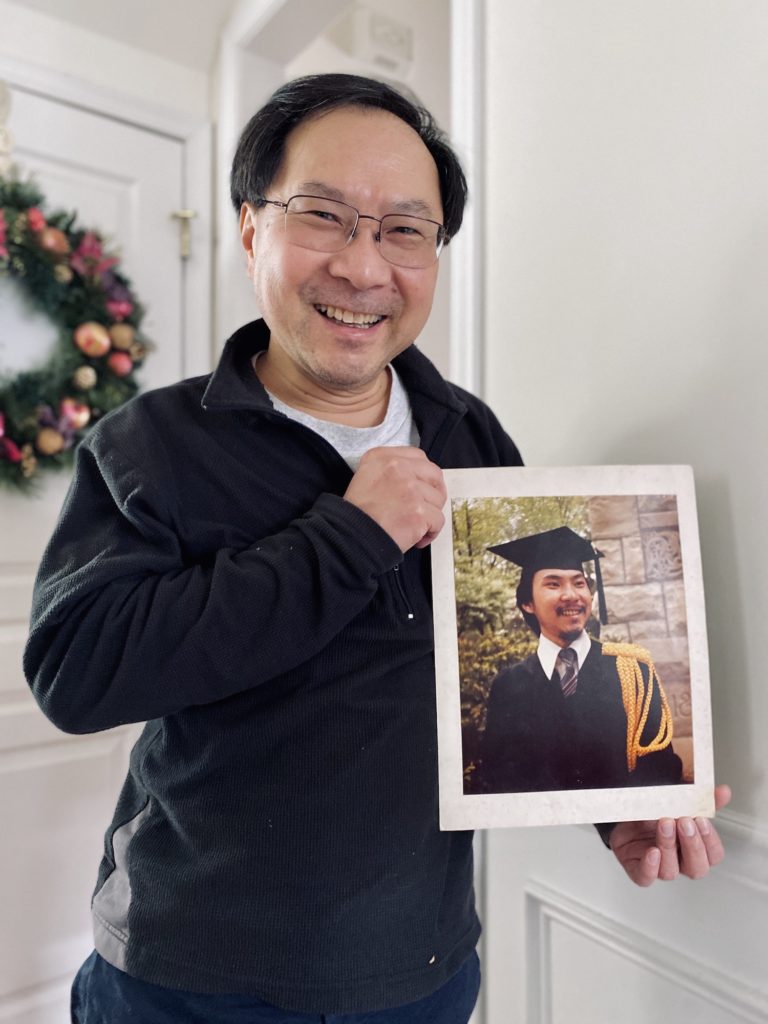
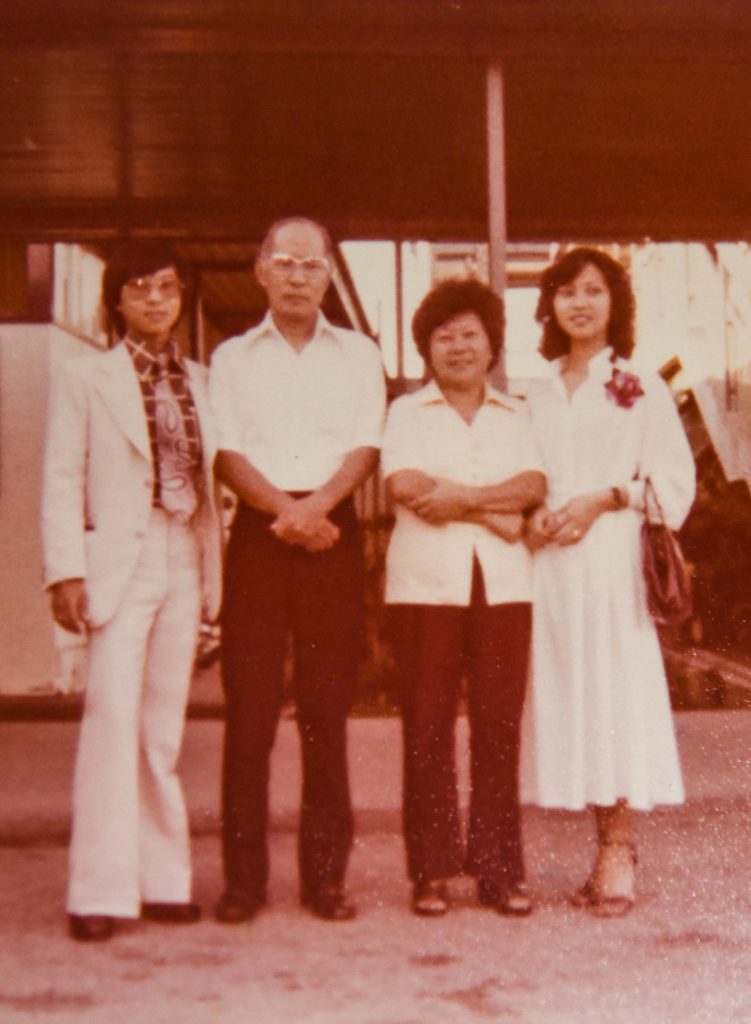
My dad also likes to recount stories of Ah Ma’s wartime experiences. To escape capture during the Japanese occupation of Malaya during World War II, she hid in the hills and subsisted on potatoes and wild vegetables until it was safe to venture out again. Eventually, she made a living as a hairdresser and seamstress.
In 2018, I had a chance to accompany my dad back to Penang, the island where he grew up. In my vlog of the visit, he gave a tour of his childhood house. Now a car dealership, the two-story abode once boasted a heavenly fruit orchard, ripe with “banana trees, a couple of jambu [guava] trees, a huge old mangosteen tree, six or seven rambutan trees… and a durian tree! Unbelievable!” Amid the clutter of cars and concrete, he showed me the room where a solid wooden table used to stand. It was here that Ah Ma would sit and sew, late into the night, to provide for their family.
It’s clear how proud my dad is of his mother. Her hard work and loving sacrifice shine through his memories. Yet as I grew older, I started to wonder about the stories left unsaid. What exactly did Ah Ma have in mind when she declared, “I’ve eaten more salt than you’ve had rice”? Given her strong belief in education, why wasn’t she able to progress past the third grade? And what about my dad’s father? He passed away before I was born. What was he like, and how did she meet him? For every fond memory of my grandmother, there was a glaring vacuum about my grandfather. Was there more to their story?
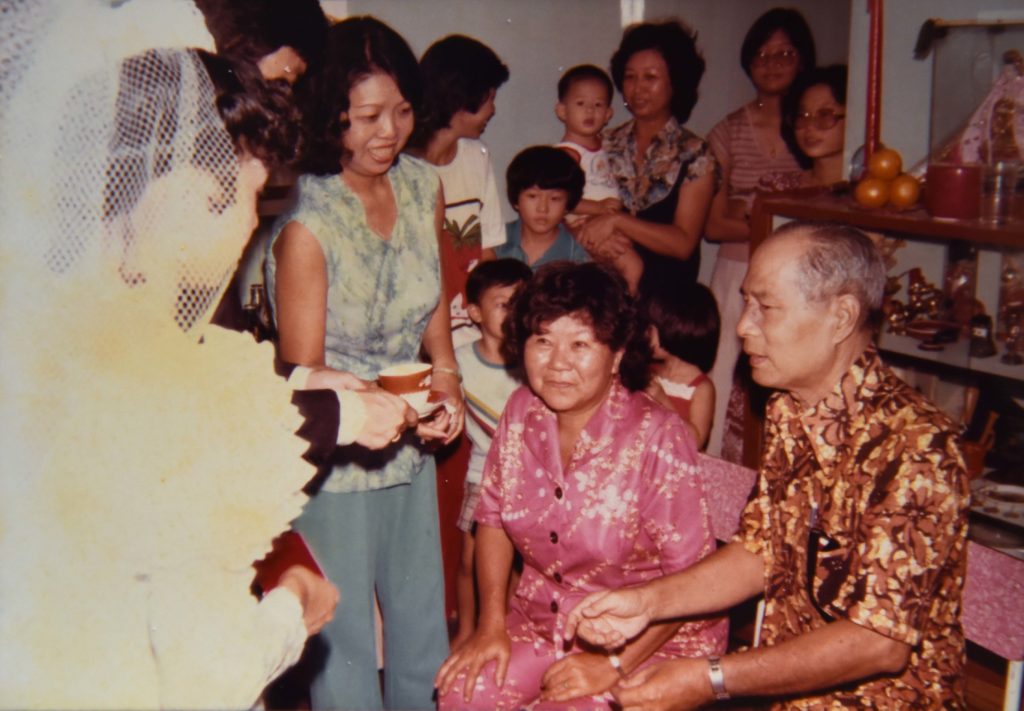
THROUGH MY AUNT’S EYES
It wasn’t until I started spending more time with my aunt – my dad’s sister – that a fuller picture began to emerge.
My grandmother, Hong Ah Lan, was born on Penang Mainland in 1923. Her father did not believe women should be educated, so he refused to support her. Not to be deterred, she resourcefully found another benefactor to sponsor her schoolbooks. For two years, she woke up every morning to walk over an hour to the nearest school and return home after sundown, often missing dinner. By third grade, she had to stop and work on a local farm to help put food on the table. We know little else about her family, as they eventually cut ties with each other.
In her late teens, Ah Lan moved to Penang Island, where she started working in hair salons. Eventually, she became skilled enough to open a hair salon of her own. When the Japanese arrived in 1941, all businesses shuttered as people retreated to the hills for safety. After a few months, she reopened shop and began servicing the wives of Japanese soldiers in exchange for small bags of rice, a highly prized commodity at the time. Quickly learning Japanese, she established enough rapport that the soldiers would offer to escort her safely home at the end of the day. At a time when people feared the enemy, she built a successful business and forged relationships on both sides of the war.
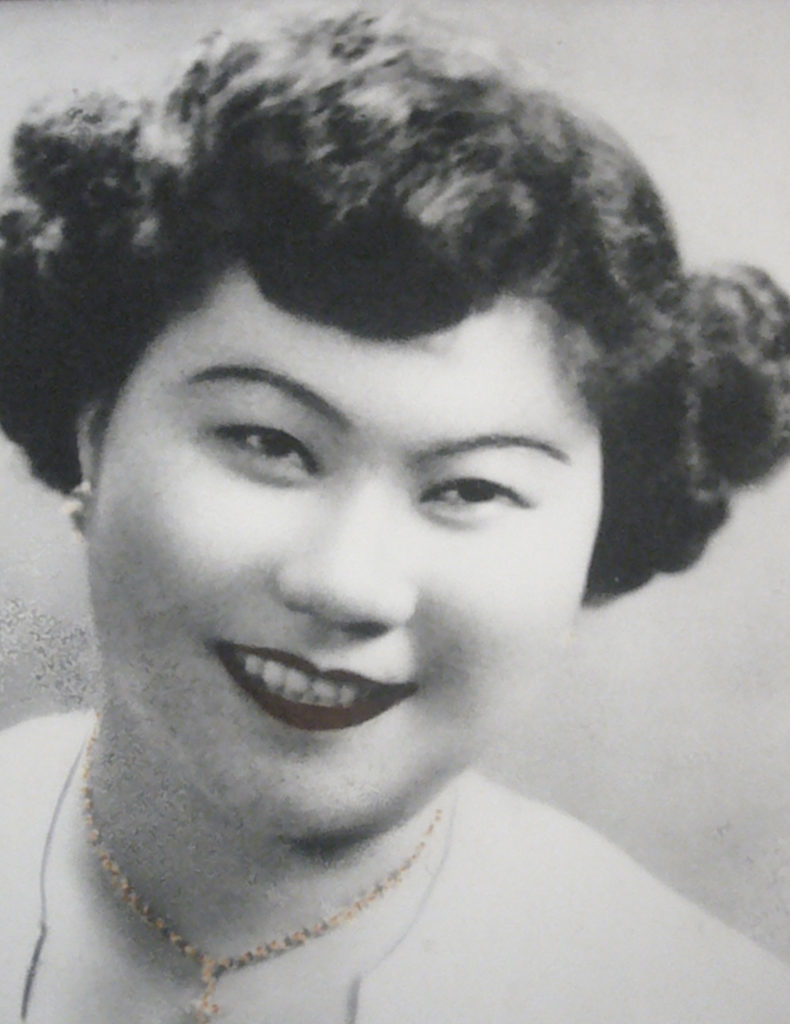
After the war, Ah Ma got married, but her husband passed away early, leaving her to raise her first two children on her own. In the 1950’s, she met my grandfather, Choo Teng Kee. Known as “Lao Hor” — the Tiger — he was a notoriously strict English teacher, prone to discipline any slackers in his class (including boys who dared to write love letters to my aunt). The youngest of nine boys, he came from a wealthy Hainanese family with a fortune in transportation, hotels, and theaters. In 1958, they had my father. Much later, she discovered he was seeing another woman — and they had conceived a son just four months earlier.
The woman pressured my grandfather into marrying her, sidelining my grandmother and her children. Rubbing “extra salt” into the wound, Teng Kee had a third love she wasn’t aware of: gambling. Ah Lan unsuspectingly lent him money, until he had squandered away her hard-earned savings.
So, the two-story house my father showed me — that was his aunt’s home. Sympathetic to their situation, Teng Kee’s eldest sister gave them a place to stay, while he lived in a separate apartment with his other family, only visiting on occasion.
When Teng Kee passed away from a heart attack, my dad had just started his career at Shamrock. He flew all the way back from New Jersey for the funeral, but he was denied the chance to say a proper goodbye. Not only was my grandmother forbidden from approaching the casket, the burial was expedited so that the ashes would be interred by the time my dad arrived. My aunt remembers the rain, the endless, pouring rain, as they stood in silence at their father’s grave.
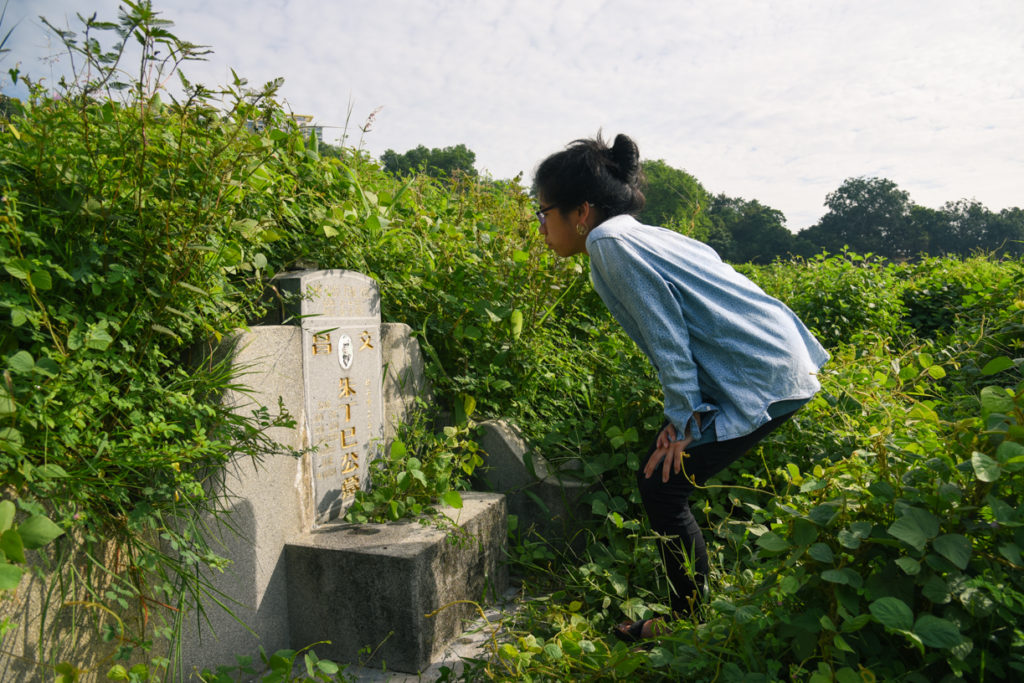
With the help of his half-brother, my dad and I visited Teng Kee’s grave in 2018 for the first time since his passing.
THROUGH MY EYES
Hearing this version of events, I felt waves of shock and anger. I didn’t know my grandfather or Ah Ma’s father, but it felt personal. How could these men do all that to us? It’s their fault my dad inherited financial burdens, instead of the freedom to follow his passions. It’s their fault I couldn’t converse with my grandmother, since she was denied an English education. Suddenly, generational patterns that I’ve observed in my family and myself made so much sense. And, with this ancestral context, my journey as a visual storyteller started to make sense too.
I was in college when my grandmother passed away. Eleven years before her departure, a sudden stroke had left her half-paralyzed and trapped in her body with impaired speech. For such a self-reliant woman, I could only imagine her frustration at being unable to walk or communicate, her active mind reduced to incoherent babble. Stuck on the couch, staring out the window, shaking her one mobile leg – this was the Ah Ma I knew.
I remember joining her on the couch one summer vacation in Penang. It was mid-afternoon. I was in middle school. In halting Mandarin as awkward as my preteen self, I showed her a simple slideshow of family photos on my dad’s laptop. Glasses perched crookedly on her nose, she hummed in recognition at our shared memories, a smile breaking across her creased face. It was the clearest conversation we ever had, images speaking where we had no words to say.
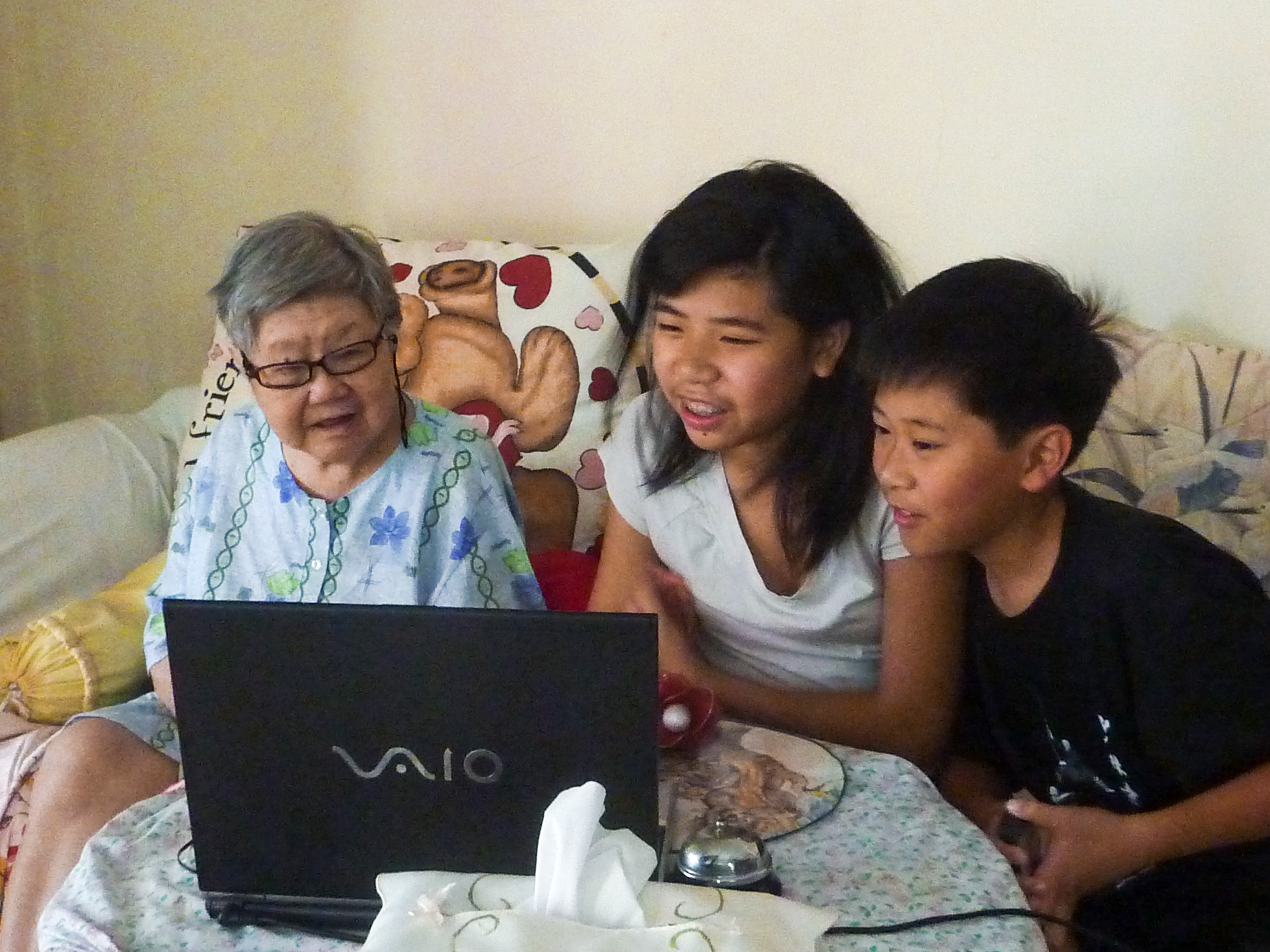
Looking back, it’s no wonder the first video I ever made was in tribute to her memory, a Christmas gift for my father after her passing. Due to exams, I wasn’t able to attend her funeral in Malaysia. I only heard that, at her request, my dad scattered her ashes to the ocean, where she would be free to roam with the waves. It was a beautiful farewell, and yet, all I could grieve was the absence of grief for someone I hardly knew.
It was on my iMovie timeline, slowly piecing together my dad’s photos and email anecdotes, that I felt Ah Ma’s presence within me for the first time. Perhaps her spirit guided me to reclaim the farewell they were once denied, celebrating her life and all they had learned together.
Knowing what I know now, I wonder if that video – and the stories my dad and I love to tell to this day – stem from a creative impulse to heal the wounds of generational trauma in our blood. While I grieve the pain that my ancestors have suffered and caused, their stories invite a nuanced understanding of why we are who we are.
Instead of taking my dad’s optimism for granted, I now marvel at his daily decision to choose joy in the face of hardship. In his refusal to allow what happens to him to define him, I recognize my grandmother’s resilience and steadfast lovingkindness. When I feel fear or courage, envy or respect, skepticism or trust… I recognize the hopes and dreams of my ancestors within me. My family’s stories offer me a mirror for self-compassion and a map to break the cycle and pass on a better inheritance. And for that, I am grateful.
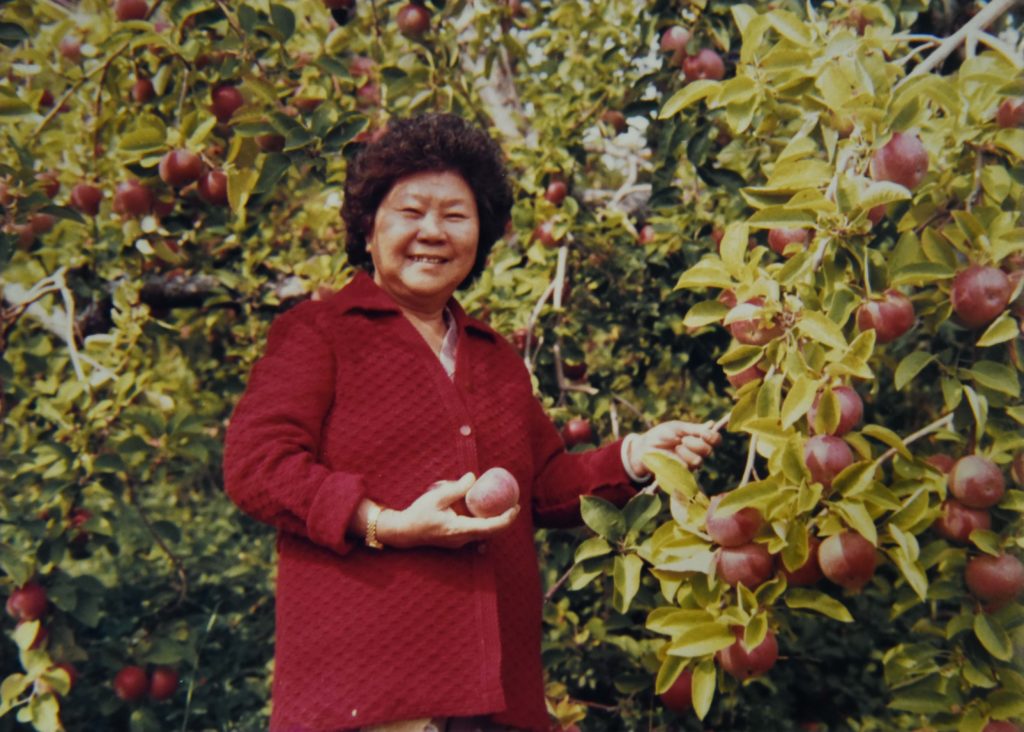
阿妈,我衷心的感谢你。


Behind the faces or ordinary neighbors lie extraordinary stories. Thank you for sharing this one. It’s a reminder to dig a little deeper at home and tell our own stories. So touched.